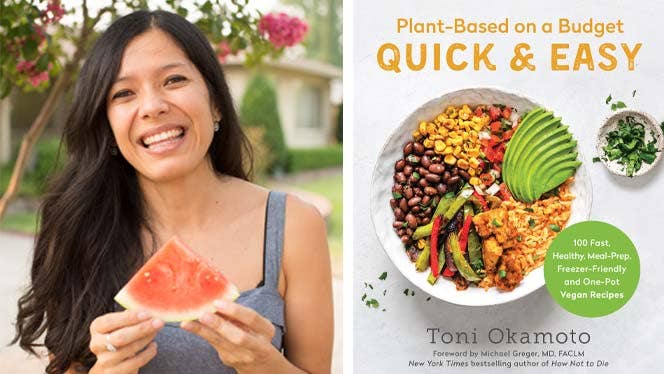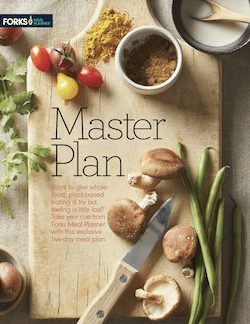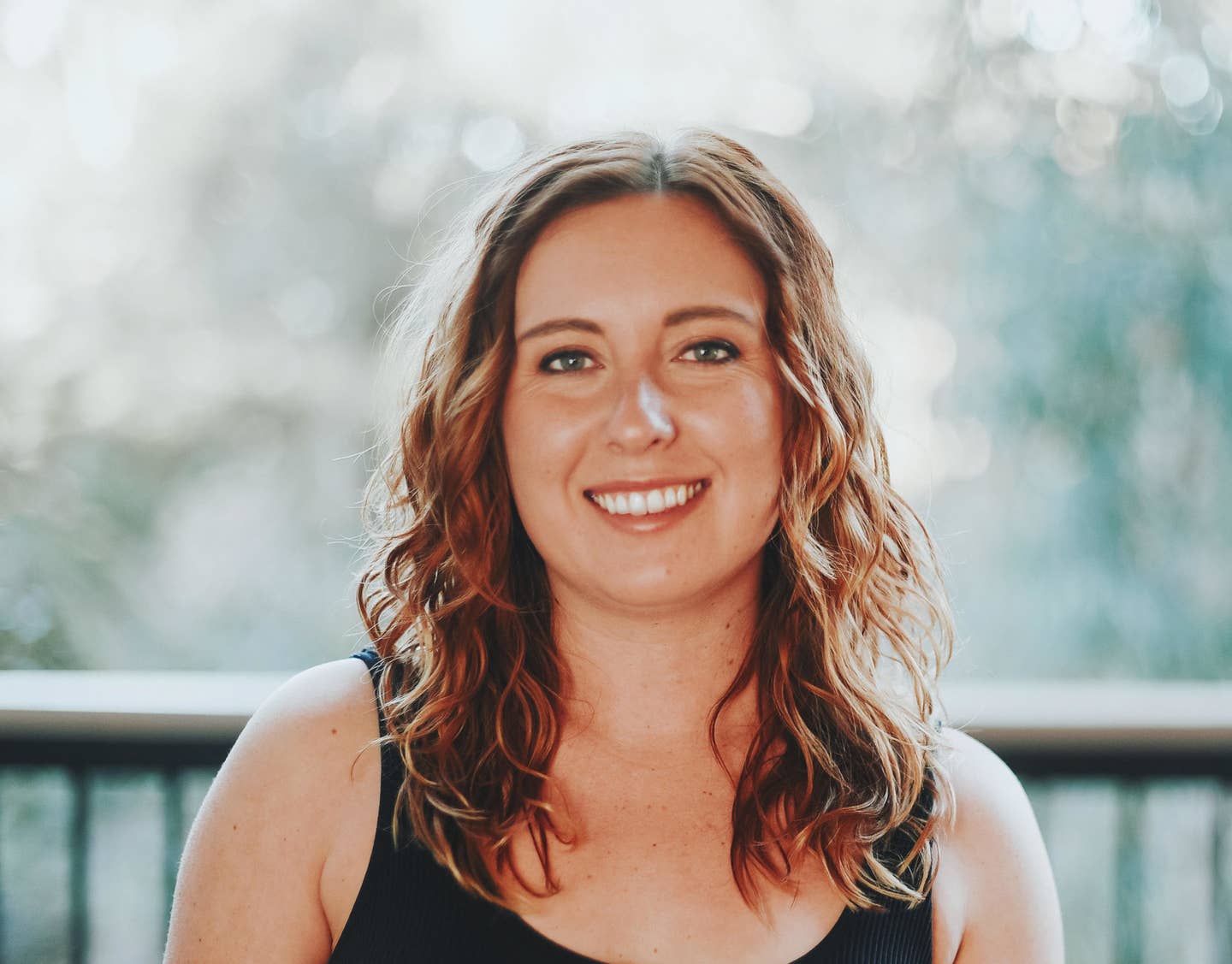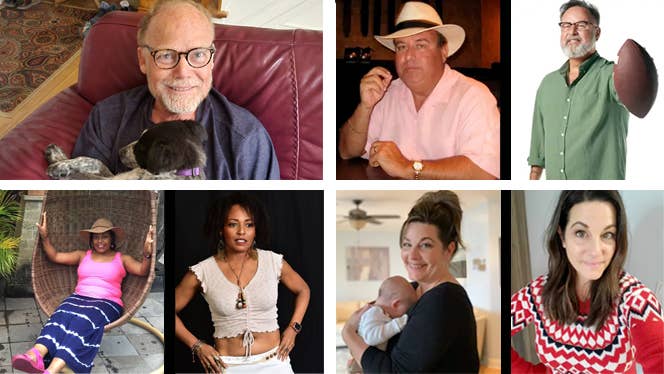
Cheap Eats: Toni Okamoto’s New Plant-Based on a Budget Cookbook Makes Vegan Meals Accessible for All
A commonly cited obstacle amongst people considering going vegan is the perceived cost. And it makes sense: Many Westerners build their diets around cheap highly processed foods, government-subsidized dairy and meat products, and the social expectation that a “real meal” should be centered around animal protein. While studies show that plant-based diets are actually the most cost-effective out of any dietary style, going vegan without a road map can certainly cause financial anxiety. Toni Okamoto, author and founder of the popular blog Plant-Based on a Budget, is here to prove that thriving on a plant-based lifestyle can actually be inexpensive.
Okamoto’s new cookbook, Plant-Based on a Budget: Quick & Easy, comes out March 7 and is packed full of vibrant recipes that get you the most bang for your buck. FOK spoke with Okamoto about her early days of being a thrifty vegan, how her family’s health challenges spurred her to create the blog, and how she hopes this new book will retire the misconception that plant-based eating isn’t an accessible option for everyone.
How were you first introduced to a plant-based diet?
Toni Okamoto: There are two chapters of my early childhood that were important to my transition to plant-based eating. My dad was really young when I was born and he went into the Navy full-time, so I lived with my grandparents while he was away. My grandpa was very active as a Japanese gardener here in the Central Valley of California, so I had easy access to fresh food and meals made from scratch. This was what I ate in my early years. Then when my dad came back from the Navy we lived the bachelor life together and ate a lot of things like boxed mac ‘n’ cheese or hotdogs with canned chili. My dad was super busy trying to raise two little kids, work full-time, and make sure we were involved in extracurricular sports. He did his very best, and that meant fast, convenient foods became my norm.
At 16 I was running track, and I would always get sick to my stomach after a long run. One day my coach said, "Hey, that's not normal for you to get sick every time you run. What are you eating?" And I thought it was such a weird question, because to me food was about how it tasted and whether it made me full. It turns out the Taco Bell that I was eating every day at lunch wasn't good for me! Same with the Hamburger Helper that I loved so much. So my coach advised me to cut out red meat, fast food, and processed foods. That was really the beginning of looking more critically at what I ate.
How did your family influence your focus on creating cost-effective, plant-based meals for your blog and subsequent cookbooks?
TO: I grew up in a primarily Mexican-American community and it was a bit of a challenge to even stop eating red meat when I was within my home, because my parents just didn't understand. Culturally, food is so important to them, and it can be a sign of rejection or disrespect when you aren’t eating someone's food. So it wasn't until I was 20 and attending community college that I was able to fully go vegan. When I made the change, I still was able to eat a lot of the food that I grew up eating by making simple swaps. That was really the foundation of Plant-Based on a Budget, because I wanted to show my family that they could continue eating the foods they loved and shopping at the places that were familiar to them. It didn’t have to be a big drastic change.
Another huge motivator was watching my family struggle with so many health issues. My aunt lost her life to Type 2 diabetes and had multiple amputations prior. My grandpa, who helped raise me, had a heart attack and then passed away from complications in a triple bypass surgery. I also had an uncle who was very young when he suffered a heart attack. Everywhere I looked, it was normal for people to take a bunch of medications for their Type 2 diabetes or their cholesterol or heart issues. Meanwhile, I was thriving on a plant-based diet and I wanted to share that. But cost came up over and over again, which is what inspired me to really hyperfocus on the issue of cheap, tasty recipes. I wanted to help people who felt sentenced to poor health due to a lack of finances to understand that there were alternatives.
What is your personal experience with eating plant-based on a budget?
TO: While my family was the primary motivator [behind starting the blog], I was also living below the poverty line. Until pretty recently, I was in a massive amount of debt and trying to work my way out of it by being very diligent about budgeting and meal planning. When I started Plant-Based on a Budget 11 years ago, I only posted recipes. But when I got to know my audience on a more personal level, it wasn't the recipes that people struggled with. It was the planning and knowing how to get the absolute most amount of meals out of your ingredients without wasting anything. Meal planning really became my focus after that. At that time in 2013, if you were on government assistance, the maximum amount of benefits you could get was $180 a month for food. So I started making meal plans with that budget in mind, and I actually got it down to $100 a month for one person. I started a Plant-Based on a Budget Meal Plan Challenge, which is what helped the blog grow so much and lead to being featured in the Netflix documentary What the Health.
How does the new Quick & Easy cookbook differ from the first Plant-Based on a Budget book?
TO: I wrote my first cookbook during a time in my life when I didn’t have a lot of money, but I had a lot of time. So, I wanted to show how you could do it on the dirt-cheapest budget. That meant making your own pizza dough from scratch, making your bread from scratch, cooking your beans from dried beans, etc. With the new Quick & Easy book, I wanted to show that it can still be done without cooking every ingredient from scratch and finding a nice balance between being budget-conscious and not spending hours in the kitchen. I really go back to my meal planning roots and write about all the different ways that you can meal prep and be really efficient in the kitchen so you can spend more time doing things you love instead of toiling away over the stove. This book shows you how to save money, save time, and still eat healthy, tasty meals.
The book includes a section in each recipe for the reader to write in their own notes. What inspired you to include this?
TO: When I went vegan 16 years ago I learned how to cook by checking out cookbooks from the library. I’d photocopy the recipes that I wanted to try before I invested in buying the book, and I would write all over those pages about any adjustments I made. Sometimes there’d be a spice that was too expensive, or I’d make a substitution based on what I had on hand. I wanted my recipes to be that same type of guide so you can really make them your own.
I've broken down each recipe in the book into four sections: There's the basic recipe that will be delicious and the most budget-conscious. But if you have more money or if you have certain ingredients on hand, I have the optional additions and swaps section to enhance the flavors. Then I have my own personal tips on how I like to make it, and finally I included the testers' tips.
Who tested the recipes?
TO: I worked with 100 recipe testers for this book, five people per recipe. They're extremely diverse. Some of them eat fast food. Some of them eat no oil, sugar, or salt. Some of them are literally kids. I asked all of them how much money they spent on the recipe and where they shopped to make sure they didn't have to go to specialty grocery stores to find specific ingredients. I wanted to make using the book a really inclusive experience so people of all backgrounds can appreciate it.
Some of your recipes include oil. How can oil-free readers adjust the recipes?
TO: I've surveyed my audience and 65% of people still eat animal products, and they're just dipping their toes into plant-based eating. I think of my recipes as kind of a bridge to a healthier lifestyle. I do have a lot of [readers] who don't eat oil, though, so I'm very conscious about providing alternatives and swaps to try and be inclusive for everybody. Any recipes of mine that include oil will let you know how to substitute water or broth for it instead.
What’s one of your favorite recipes in the new book?
TO: There are a few that hold a special place in my heart. One of them is sopa de fideo, it’s a soup with broken up angel hair pasta. The base is made from tomatoes, and it has zucchini, black beans, onion, and garlic, and you can add more vegetables if you want. It was something that my grandma made me, and every time I eat it I'm transported back to a place in my life where I was comforted and loved. When my grandma would make it, she would sometimes use the little stars or the little macaronis. You can easily use any type of whole wheat pasta that you want.
What are your best tips for people who are brand-new to a plant-based diet?
TO: First, I would explain the importance of a good mindset. It's not all or nothing; it's about progress over perfection. For me, I had setbacks in my early years that could be overwhelming, but I've decided to show myself grace. So, as long as people know that they can continue to choose plant-based for their next meal over and over again, it seems more achievable.
The second piece of advice I have is stocking your kitchen with the right equipment that will set you up for success. You don't need all the fanciest stuff up front, but investing over time, which is what I did, will help you in the long run. When I first started I didn't even have a pot with a lid. I would put my frying pan over a pot to cook rice! You can do it with the bare minimum, but if you can buy a nice knife, cutting board, some Tupperware—and if you have the money, a good blender, pressure cooker, and air fryer—then you’ll be totally set for your transition.
What do you hope the new cookbook provides for people?
TO: I hope that it makes plant-based eating more accessible and less overwhelming. I know that in my early days it was a challenge, and I want to eliminate a lot of the concerns right up front about cost, convenience, taste, and cook time to help make someone's transition really easy. I want them to feel like we're friends, because I really truly care about them and believe that they can make a huge change in their lives that will benefit their family for generations.
Free Download
Free 5-day meal plan!
Get a taste for healthy, fuss-free meal planning with this free five-day meal plan from Forks Meal Planner!
By providing your email address, you consent to receive newsletter emails from Forks Over Knives. We value your privacy and will keep your email address safe. You may unsubscribe from our emails at any time.

About the Author

About the Author
Megan Edwards
Join our mailing list
Get free recipes and the latest info on living a happy, healthy plant-based lifestyle.
By providing your email address, you consent to receive newsletter emails from Forks Over Knives. We value your privacy and will keep your email address safe. You may unsubscribe from our emails at any time.
